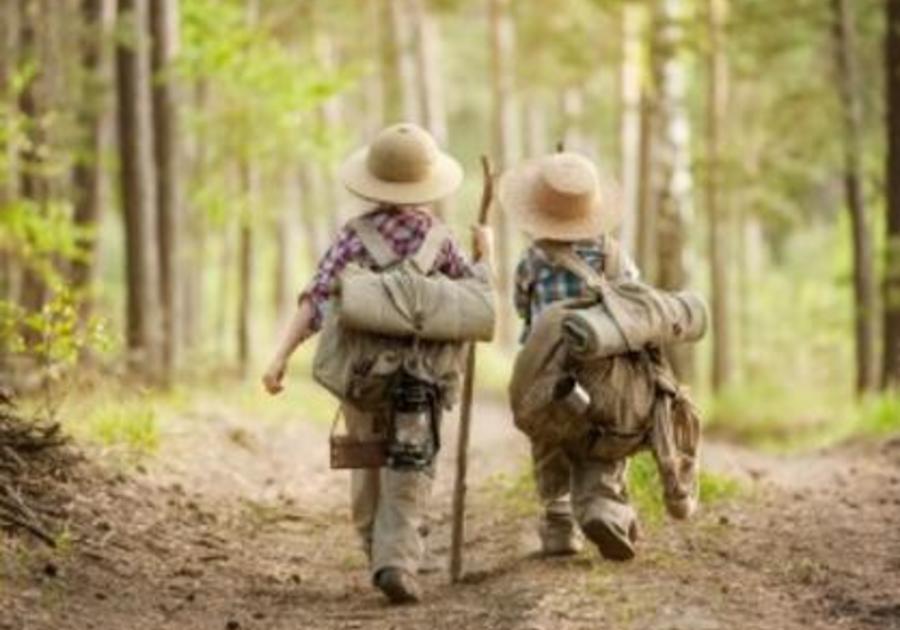Even a short hike with kids requires some planning and essential equipment. A little bit of preparation will help you enjoy your outing more and will ensure you have basic safety items ... just in case.
Create a hiking backpack so you don't have to pack and repack for every trip, just restock what you use. Young children can carry light backpacks with water, snacks, a rain jacket, and a hat.
Here are the 13 things you won't want to leave without.
- Common Sense. It may seem obvious, but sometimes excitement about a new adventure overshadows common sense. Don't start a hike in flip-flops. Remember to bring your backpack with the rest of your essentials. Check the weather forecast before you depart. If you are pretty sure you'll get hit by a thunderstorm, reschedule for another day. Know the rules, regulations, and dangers of the area. Pay attention to your surroundings and to how everyone in your group is feeling. Unless you are on a loop trail, your hike is halfway through only once you turn around, so don't hike till you're tired.
- Water. Every person should carry water, at least two bottles each. Dehydration is a greater risk in the hottest part of the day, so bring a little extra if you'll be hiking in the afternoon.
- Energy snacks. Everyone will have to replace the energy burned. Nuts, seeds, trail mix, and granola bars are lightweight high-energy options.
- Map/Trail Guide and Compass. Shorter trails often connect to longer trails, so it is important to know where you are and where you are going. A simple compass will help orient you and your map to magnetic north. Don't rely on apps on your phone, since batteries die and service can be spotty.
- Extra Clothes. Rain can happen unexpectedly, especially on a summer afternoon. Cold can happen too. Dress in layers and pack a lightweight rain jacket, just in case. A hat with a visor can help keep sun and rain off your face and out of your eyes.
- Sunglasses and Sunscreen. Sunglasses will help protect your eyes from dust, bugs, and sunlight. Sunscreen will help prevent sunburn. Hiking is no fun if you are uncomfortable!
- Insect Repellent. Mosquito bites are easier to prevent than to treat, especially on kids. Keep them away from you as much as possible.
- First Aid Kit. You can buy a pre-packaged compact kit or make your own. The basic components are antiseptic wipes, antibiotic ointment, bandages, tweezers, antihistamine, and moleskin (for blisters). Longer hikes and challenging trails require additional items.
- Cell Phone and Whistle. In case of emergency, a fully-charged cell phone may allow you to call for help, but since cell service can be spotty on hiking trails, a whistle is important too. It requires less of your energy to blow a whistle than it does to yell for help.
- Flashlight or Headlamp. Even if you don't plan to be out after dark, it is better to be prepared. Check the batteries before you leave, and pack extras too.
- Fire Starter and Matches. Carry a lighter, waterproof matches, and leftover birthday candles in a small waterproof container. In an emergency, you may need to stay warm till help arrives.
- Knife or Multi-Tool. Ask any Boy Scout or Girl Scout ... this little tool can solve a variety of problems you could encounter on the trail.
- Respect for the Great Outdoors. Remember: Take only pictures, leave only footprints. Stay on the trail to preserve the wilderness as well as minimize dangers (like poison oak, snakes, and accidents).
There are also a few items that are not essential but are fun to take, especially when hiking with kids ... a notepad and pencil, a sketchpad and colored pencils, a camera, and binoculars. Taking notes, drawing pictures, and snapping photos will help you create a memory book or keepsake of your adventure when you return home.


